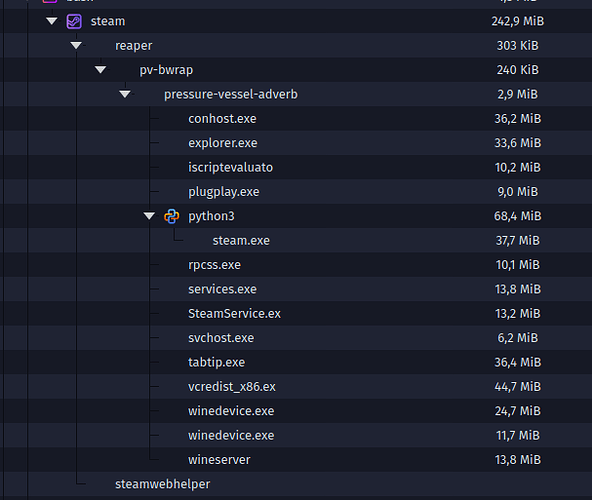Good morning, folks! So, I’ve decided to kill some of my Steam library backlog, forcing myself to play at least once every game I have (when I started this, I had over 500 titles never played there, I’m down to 450 currently).
But, and here’s the point of this thread, I’ve been noticing quite a few games so far won’t “just run” when I boot as usual - which means zen. The latest I’ve had this issue with was Driftland, gold in ProtonDB, but here on zen it’d never get past the “starting up” phase. Then I thought of switching to lts and bam, ended up playing it for 2 hours yesterday.
I missed taking notes when this happened before, but considering I’ve been through ~50 games in the past week or so, I’d say at least 10 of them had issues when running with zen, but no problems on lts.
Should I just give up on zen, remove it and turn lts into the boot as usual?
System:
Kernel: 6.1.54-1-lts arch: x86_64 bits: 64 compiler: gcc v: 13.2.1 clocksource: tsc
available: acpi_pm parameters: BOOT_IMAGE=/@/boot/vmlinuz-linux-lts
root=UUID=468e3250-834f-4678-85b1-f50f268e557d rw rootflags=subvol=@ quiet quiet
rd.udev.log_priority=3 vt.global_cursor_default=0
resume=UUID=92d5bc58-440e-4eab-9f01-4fa35d34e02b loglevel=3
Desktop: KDE Plasma v: 5.27.8 tk: Qt v: 5.15.10 wm: kwin_x11 vt: 2 dm: SDDM
Distro: Garuda Linux base: Arch Linux
Machine:
Type: Laptop System: Dell product: G5 5590 v: N/A serial: <superuser required> Chassis: type: 10
serial: <superuser required>
Mobo: Dell model: 0F3T2G v: A00 serial: <superuser required> UEFI: Dell v: 1.22.0
date: 11/10/2022
Battery:
ID-1: BAT0 charge: 45.4 Wh (100.0%) condition: 45.4/60.0 Wh (75.6%) volts: 16.8 min: 15.2
model: SMP DELL JJPFK87 type: Li-poly serial: <filter> status: full
CPU:
Info: model: Intel Core i7-9750H bits: 64 type: MT MCP arch: Coffee Lake gen: core 9 level: v3
note: check built: 2018 process: Intel 14nm family: 6 model-id: 0x9E (158) stepping: 0xA (10)
microcode: 0xF4
Topology: cpus: 1x cores: 6 tpc: 2 threads: 12 smt: enabled cache: L1: 384 KiB
desc: d-6x32 KiB; i-6x32 KiB L2: 1.5 MiB desc: 6x256 KiB L3: 12 MiB desc: 1x12 MiB
Speed (MHz): avg: 4134 high: 4199 min/max: 800/4500 scaling: driver: intel_pstate
governor: powersave cores: 1: 4081 2: 4109 3: 4101 4: 4035 5: 4088 6: 4136 7: 4187 8: 4137
9: 4180 10: 4190 11: 4165 12: 4199 bogomips: 62431
Flags: avx avx2 ht lm nx pae sse sse2 sse3 sse4_1 sse4_2 ssse3 vmx
Vulnerabilities: <filter>
Graphics:
Device-1: Intel CoffeeLake-H GT2 [UHD Graphics 630] vendor: Dell driver: i915 v: kernel
arch: Gen-9.5 process: Intel 14nm built: 2016-20 ports: active: none off: eDP-1 empty: DP-1,
DP-2, HDMI-A-1, HDMI-A-2 bus-ID: 00:02.0 chip-ID: 8086:3e9b class-ID: 0300
Device-2: NVIDIA TU106M [GeForce RTX 2060 Mobile] vendor: Dell driver: nvidia v: 535.104.05
alternate: nouveau,nvidia_drm non-free: 535.xx+ status: current (as of 2023-08) arch: Turing
code: TUxxx process: TSMC 12nm FF built: 2018-22 pcie: gen: 2 speed: 5 GT/s lanes: 8 link-max:
gen: 3 speed: 8 GT/s lanes: 16 bus-ID: 01:00.0 chip-ID: 10de:1f11 class-ID: 0300
Device-3: Microdia Integrated_Webcam_HD driver: uvcvideo type: USB rev: 2.0 speed: 480 Mb/s
lanes: 1 mode: 2.0 bus-ID: 1-5:3 chip-ID: 0c45:671f class-ID: 0e02
Display: x11 server: X.Org v: 21.1.8 with: Xwayland v: 23.2.0 compositor: kwin_x11 driver: X:
loaded: modesetting,nvidia unloaded: nouveau alternate: fbdev,intel,nv,vesa dri: iris gpu: i915
display-ID: :0 screens: 1
Screen-1: 0 s-res: 2560x2160 s-dpi: 96 s-size: 675x570mm (26.57x22.44") s-diag: 883mm (34.78")
Monitor-1: DP-1-0 pos: primary,top res: 2560x1080 hz: 60 dpi: 81 size: 798x334mm (31.42x13.15")
diag: 865mm (34.06") modes: N/A
Monitor-2: HDMI-1-0 pos: bottom res: 2560x1080 hz: 60 dpi: 96 size: 677x290mm (26.65x11.42")
diag: 736mm (29") modes: N/A
Monitor-3: eDP-1 size-res: N/A modes: N/A
API: OpenGL v: 4.6 Mesa 23.1.7-arch1.1 renderer: Mesa Intel UHD Graphics 630 (CFL GT2)
direct-render: Yes
Audio:
Device-1: Intel Cannon Lake PCH cAVS vendor: Dell driver: snd_hda_intel v: kernel
alternate: snd_soc_skl,snd_sof_pci_intel_cnl bus-ID: 00:1f.3 chip-ID: 8086:a348 class-ID: 0403
Device-2: NVIDIA TU106 High Definition Audio vendor: Dell driver: snd_hda_intel v: kernel pcie:
gen: 1 speed: 2.5 GT/s lanes: 8 link-max: gen: 3 speed: 8 GT/s lanes: 16 bus-ID: 01:00.1
chip-ID: 10de:10f9 class-ID: 0403
Device-3: Realtek USB Audio driver: snd-usb-audio type: USB rev: 2.0 speed: 480 Mb/s lanes: 1
mode: 2.0 bus-ID: 1-4.5:6 chip-ID: 0bda:4014 class-ID: 0102 serial: <filter>
API: ALSA v: k6.1.54-1-lts status: kernel-api with: aoss type: oss-emulator tools: N/A
Server-1: PipeWire v: 0.3.80 status: active with: 1: pipewire-pulse status: active
2: wireplumber status: active 3: pipewire-alsa type: plugin 4: pw-jack type: plugin
tools: pactl,pw-cat,pw-cli,wpctl
Network:
Device
-1: Realtek vendor: Dell driver: r8169 v: kernel pcie: gen: 1 speed: 2.5 GT/s lanes: 1
port: 3000 bus-ID: 3c:00.0 chip-ID: 10ec:2502 class-ID: 0200
IF: enp60s0 state: down mac: <filter>
Device-2: Qualcomm Atheros QCA6174 802.11ac Wireless Network Adapter vendor: Dell
driver: ath10k_pci v: kernel pcie: gen: 1 speed: 2.5 GT/s lanes: 1 bus-ID: 3d:00.0
chip-ID: 168c:003e class-ID: 0280 temp: 48.0 C
IF: wlp61s0 state: down mac: <filter>
Device-3: Realtek RTL8153 Gigabit Ethernet Adapter driver: r8152 type: USB rev: 3.0
speed: 5 Gb/s lanes: 1 mode: 3.2 gen-1x1 bus-ID: 6-1.2:3 chip-ID: 0bda:8153 class-ID: 0000
serial: <filter>
IF: enp58s0u1u2 state: up speed: 1000 Mbps duplex: full mac: <filter>
Bluetooth:
Device-1: Qualcomm Atheros driver: btusb v: 0.8 type: USB rev: 2.0 speed: 12 Mb/s lanes: 1
mode: 1.1 bus-ID: 1-14:8 chip-ID: 0cf3:e007 class-ID: e001
Report: btmgmt ID: hci0 rfk-id: 0 state: up address: <filter> bt-v: 4.2 lmp-v: 8 status:
discoverable: no pairing: no class-ID: 7c010c
Drives:
Local Storage: total: 1.14 TiB used: 737.91 GiB (63.1%)
SMART Message: Unable to run smartctl. Root privileges required.
ID-1: /dev/nvme0n1 maj-min: 259:0 vendor: Western Digital model: PC SN520 NVMe WDC 256GB
size: 238.47 GiB block-size: physical: 512 B logical: 512 B speed: 15.8 Gb/s lanes: 2 tech: SSD
serial: <filter> fw-rev: 20240012 temp: 52.9 C scheme: GPT
ID-2: /dev/sda maj-min: 8:0 vendor: Western Digital model: WD10SPZX-75Z10T3 size: 931.51 GiB
block-size: physical: 4096 B logical: 512 B speed: 6.0 Gb/s tech: HDD rpm: 5400 serial: <filter>
fw-rev: 4514 scheme: GPT
Partition:
ID-1: / raw-size: 221.19 GiB size: 221.19 GiB (100.00%) used: 184.87 GiB (83.6%) fs: btrfs
dev: /dev/nvme0n1p2 maj-min: 259:2
ID-2: /boot/efi raw-size: 300 MiB size: 299.4 MiB (99.80%) used: 632 KiB (0.2%) fs: vfat
dev: /dev/nvme0n1p1 maj-min: 259:1
ID-3: /home raw-size: 221.19 GiB size: 221.19 GiB (100.00%) used: 184.87 GiB (83.6%) fs: btrfs
dev: /dev/nvme0n1p2 maj-min: 259:2
ID-4: /var/log raw-size: 221.19 GiB size: 221.19 GiB (100.00%) used: 184.87 GiB (83.6%)
fs: btrfs dev: /dev/nvme0n1p2 maj-min: 259:2
ID-5: /var/tmp raw-size: 221.19 GiB size: 221.19 GiB (100.00%) used: 184.87 GiB (83.6%)
fs: btrfs dev: /dev/nvme0n1p2 maj-min: 259:2
Swap:
Kernel: swappiness: 133 (default 60) cache-pressure: 100 (default) zswap: no
ID-1: swap-1 type: zram size: 15.31 GiB used: 13.2 MiB (0.1%) priority: 100 comp: zstd
avail: lzo,lzo-rle,lz4,lz4hc,842 max-streams: 12 dev: /dev/zram0
ID-2: swap-2 type: partition size: 16.98 GiB used: 0 KiB (0.0%) priority: -2
dev: /dev/nvme0n1p3 maj-min: 259:3
Sensors:
System Temperatures: cpu: 61.0 C pch: 71.0 C mobo: N/A
Fan Speeds (rpm): N/A
Info:
Processes: 341 Uptime: 25m wakeups: 3 Memory: total: 16 GiB note: est. available: 15.31 GiB
used: 7.42 GiB (48.5%) Init: systemd v: 254 default: graphical tool: systemctl Compilers:
gcc: 13.2.1 clang: 16.0.6 Packages: pm: pacman pkgs: 1917 libs: 482
tools: gnome-software,octopi,pamac,paru,yay Client: shell wrapper v: 5.1.16-release inxi: 3.3.29
Garuda (2.6.16-1):
System install date: 2023-04-01
Last full system update: 2023-09-20
Is partially upgraded: No
Relevant software: snapper NetworkManager dracut nvidia-dkms
Windows dual boot: No/Undetected
Failed units:

